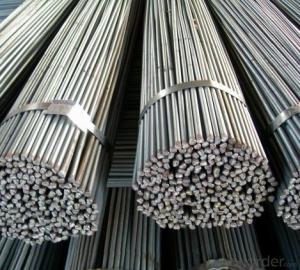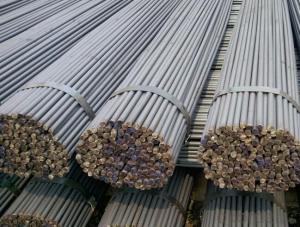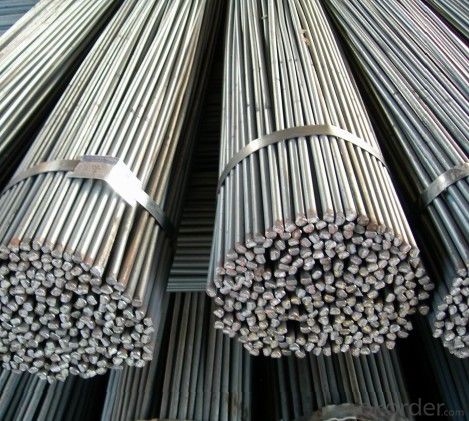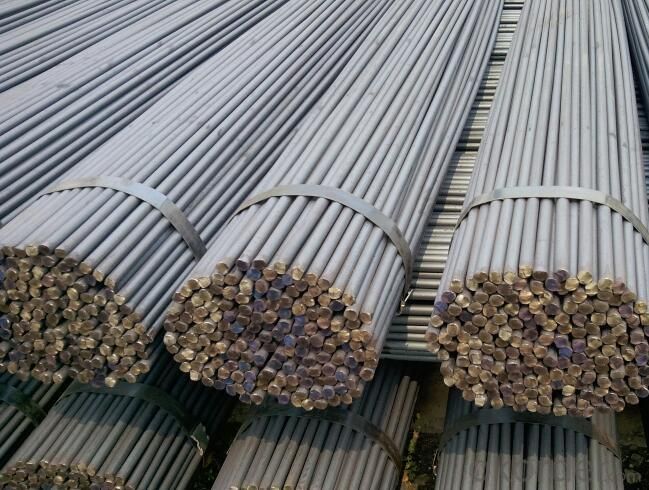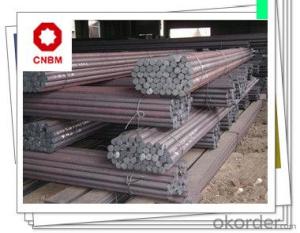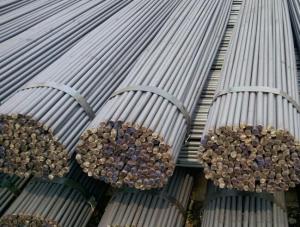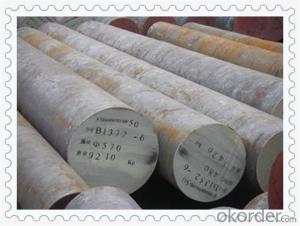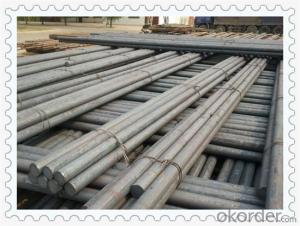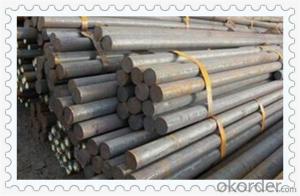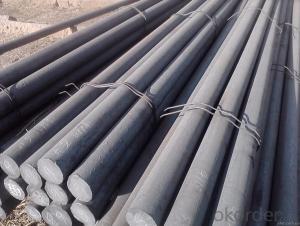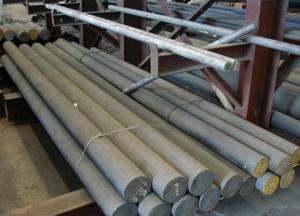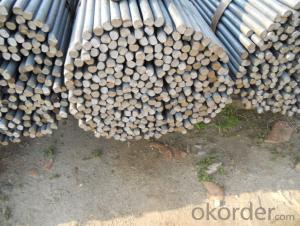Low Carbon Steel Round Bars with Variety Sizes
- Loading Port:
- China main port
- Payment Terms:
- TT OR LC
- Min Order Qty:
- 100 m.t.
- Supply Capability:
- 5000 m.t./month
OKorder Service Pledge
OKorder Financial Service
You Might Also Like
Product Description:
OKorder is offering Low Carbon Steel Round Bars with Variety Sizes at great prices with worldwide shipping. Our supplier is a world-class manufacturer of steel, with our products utilized the world over. OKorder annually supplies products to African, South American and Asian markets. We provide quotations within 24 hours of receiving an inquiry and guarantee competitive prices.
Product Applications:
Low Carbon Steel Round Bars with Variety Sizes are ideal for structural applications and are widely used in the construction of buildings and bridges, and the manufacturing, petrochemical, and transportation industries.
Product Advantages:
OKorder's Low Carbon Steel Round Bars with Variety Sizes are durable, strong, and wide variety of sizes.
Main Product Features:
· Premium quality
· Prompt delivery & seaworthy packing (30 days after receiving deposit)
· Can be recycled and reused
· Mill test certification
· Professional Service
· Competitive pricing
Product Specifications:
Manufacture: Hot rolled
Grade: Q195 – 235
Certificates: ISO, SGS, BV, CIQ
Length: 6m – 12m, as per customer request
Packaging: Export packing, nude packing, bundled
| ROUND BAR | |
| SIZE d(mm) | theoretical kg/m |
| 5.5 | 0.186 |
| 6 | 0.222 |
| 7 | 0.302 |
| 8 | 0.395 |
| 9 | 0.499 |
| 10 | 0.617 |
| 11 | 0.746 |
| 12 | 0.888 |
| 13 | 1.04 |
| 14 | 1.21 |
| 15 | 1.39 |
| 16 | 1.58 |
| 17 | 1.78 |
| 18 | 2 |
| 19 | 2.23 |
| 20 | 2.47 |
| 21 | 2.72 |
| 22 | 2.98 |
| 24 | 3.55 |
| 25 | 3.85 |
| 26 | 4.17 |
| 28 | 4.83 |
| 30 | 5.55 |
| 32 | 6.31 |
| 34 | 7.13 |
| 36 | 7.99 |
| 38 | 8.9 |
| 40 | 9.86 |
| 42 | 10.9 |
| 45 | 12.5 |
| 48 | 14.2 |
| 50 | 15.4 |
| 53 | 17.3 |
| 56 | 19.3 |
| 60 | 22.2 |
| 63 | 24.5 |
| 65 | 26 |
| 70 | 30.2 |
| 75 | 34.7 |
| 80 | 39.5 |
| 85 | 44.5 |
| 90 | 49.9 |
| 95 | 55.6 |
| 100 | 61.7 |
FAQ:
Q1: Why buy Materials & Equipment from OKorder.com?
A1: All products offered byOKorder.com are carefully selected from China's most reliable manufacturing enterprises. Through its ISO certifications, OKorder.com adheres to the highest standards and a commitment to supply chain safety and customer satisfaction.
Q2: what is the difference between actual weight and theoretical weight?
A2: All the section steel has two weights: actual weight and theoretical weight. Actual weight is the weighing out when the product delivered from the mill. Theoretical weight is calculated by pieces. The invoice can be based on each of them as your request
Q3: How many tons of steel products could be loaded in containers?
A3: Usually the steel products are delivered by bulk vessel because of the large quantity and the freight. However, there are no bulk vessel enter some seaports so that we have to deliver the cargo by containers. The 6m steel product can be loaded in 20FT container, but the quantity is changed according to the size, usually from 18tons to 25tons.
Images:
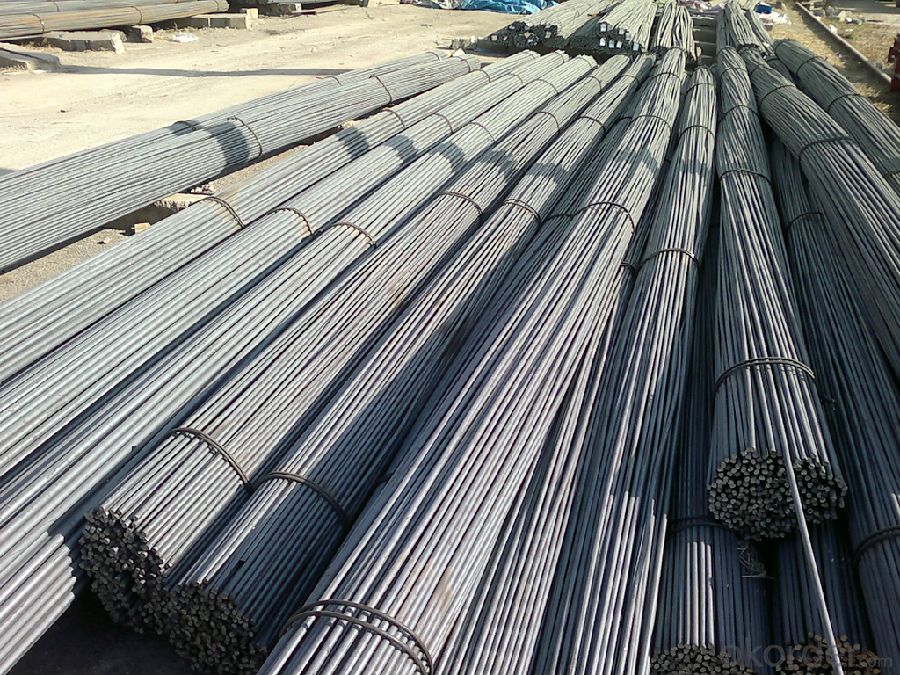
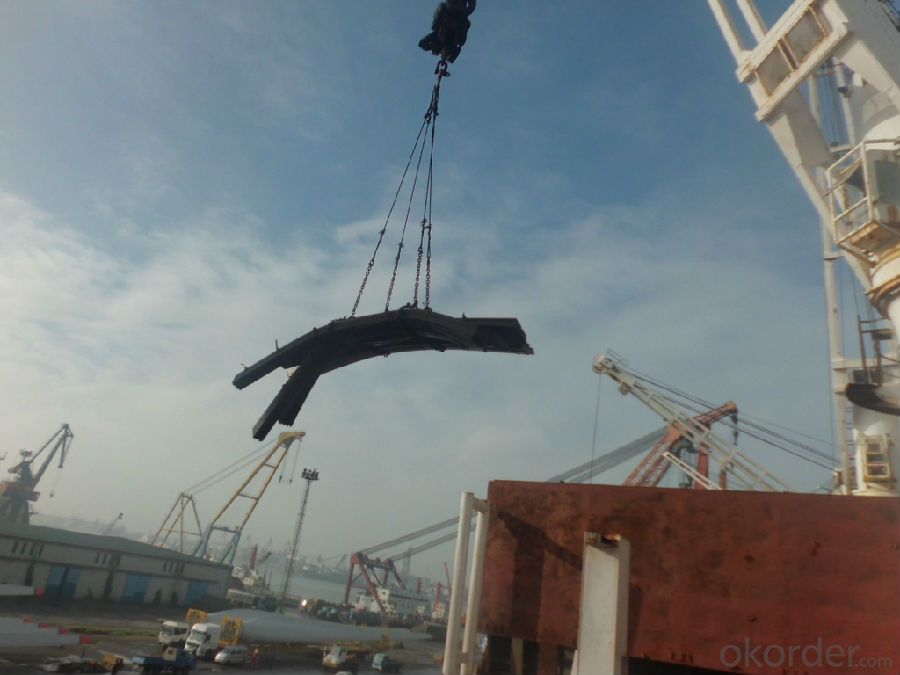
- Q: What are the different types of steel round bars used in the automotive steering systems?
- In automotive steering systems, there exists a range of steel round bars with distinctive properties and advantages. 1. Carbon Steel Round Bars: These round bars are extensively utilized in automotive steering systems due to their superior strength and durability. They are suitable for various steering components like tie rods and drag links. Additionally, carbon steel round bars are cost-effective and readily accessible, making them a popular choice in the automotive industry. 2. Alloy Steel Round Bars: By incorporating alloying elements such as chromium, nickel, and molybdenum into carbon steel, alloy steel round bars enhance their strength, hardness, and wear resistance. They are particularly useful in high-stress areas of the steering system, including steering shafts and steering knuckles, where additional strength is required. 3. Stainless Steel Round Bars: Stainless steel round bars are renowned for their exceptional resistance to corrosion, making them ideal for steering components exposed to harsh environments or moisture. Steering column shafts and tie rod ends frequently incorporate stainless steel round bars. 4. Tool Steel Round Bars: Steering system components that demand high hardness, wear resistance, and toughness often utilize tool steel round bars. These bars are commonly employed in the production of steering gears and other precision steering components. 5. High-Strength Low-Alloy (HSLA) Steel Round Bars: HSLA steel round bars, a type of alloy steel, offer a favorable balance between strength, toughness, and formability. Lightweight steering system components often employ HSLA steel round bars to reduce weight while maintaining structural integrity. Ultimately, the selection of steel round bars in automotive steering systems depends on factors such as the specific application, desired strength, durability, and corrosion resistance. Manufacturers carefully choose the appropriate steel type to ensure optimal performance and safety in steering systems.
- Q: How do steel round bars differ from steel square bars?
- Steel round bars and steel square bars differ in their shape and cross-sectional design. While round bars possess a circular shape throughout their length, square bars have a square shape. This distinction affects their mechanical properties and applications. Round bars offer enhanced tensile strength and are often used in applications where rotational motion or bending is required, such as in construction, machining, and transportation industries. On the other hand, square bars provide more stability and structural support due to their flat sides, making them suitable for applications requiring load-bearing capabilities, like supports, frames, and braces. Ultimately, the choice between round bars and square bars depends on the specific requirements and intended use of the steel.
- Q: What is the difference between a rough turned and a centerless ground steel round bar?
- A rough turned steel round bar is a steel bar that has been machined to a standard size and shape using a lathe or turning machine. This involves removing excess material from the bar's surface to achieve the desired diameter and smoothness. The resulting rough turned bar may still have minor imperfections or variations in size and surface finish. On the contrary, a centerless ground steel round bar undergoes a different manufacturing process. This process involves feeding the steel bar through two rotating wheels - a grinding wheel and a regulating wheel. The grinding wheel removes material from the bar's surface to achieve a precise diameter, while the regulating wheel controls the bar's feed rate. This process ensures precise tolerances, an excellent surface finish, and a consistent diameter along the entire length of the bar. In conclusion, the primary distinction between a rough turned and a centerless ground steel round bar lies in the manufacturing process and resulting quality. While a rough turned bar is machined to a standard size and shape with some imperfections, a centerless ground bar undergoes a more precise grinding process to achieve a highly accurate diameter, excellent surface finish, and consistent dimensions throughout the bar.
- Q: Can steel round bars be used in the manufacturing of lighting fixtures?
- Yes, steel round bars can be used in the manufacturing of lighting fixtures. Steel is a versatile and durable material that can provide structural support and aesthetic appeal to lighting fixtures. Steel round bars can be fashioned into various shapes and sizes to create different components of lighting fixtures, such as frames, bases, or decorative elements. Additionally, steel can be easily manipulated through welding, bending, or machining processes to meet specific design requirements. It is also worth noting that steel has excellent corrosion resistance properties, ensuring that lighting fixtures made from steel round bars can withstand harsh environments and have a longer lifespan. Overall, steel round bars are a popular choice in the manufacturing of lighting fixtures due to their strength, versatility, and ability to enhance the overall design aesthetic.
- Q: Can steel round bars be used in marine environments?
- Steel round bars can indeed be utilized in marine settings. Nonetheless, it is crucial to select the appropriate steel variant that is specifically engineered for marine purposes. Among the various options, stainless steel stands out as the most frequently utilized due to its ability to resist corrosion. This is primarily due to its high chromium content, which facilitates the formation of a protective oxide layer on the steel's surface, thereby safeguarding it against corrosion caused by saltwater and other harsh elements. Moreover, stainless steel round bars are renowned for their robustness and durability, making them well-suited for an array of marine applications such as ship construction, offshore structures, and marine equipment. To ensure the enduring performance of steel round bars in marine environments, regular maintenance and proper care are imperative.
- Q: Are steel round bars suitable for agricultural applications?
- Yes, steel round bars are suitable for agricultural applications. They possess strong structural integrity, durability, and resistance to corrosion, making them ideal for various agricultural uses such as fencing, livestock handling equipment, and machinery parts. The versatility and reliability of steel round bars make them a popular choice in the agricultural industry.
- Q: Are steel round bars suitable for outdoor sculptures?
- Yes, steel round bars are suitable for outdoor sculptures. Steel is a durable and strong material that can withstand harsh weather conditions, such as rain, snow, and extreme temperatures. It is resistant to corrosion, making it a great choice for outdoor use. Steel round bars can be easily shaped and welded together to create intricate and detailed sculptures. Additionally, steel can be finished with various coatings, such as powder coating or paint, to further protect it from the elements and enhance its appearance. Overall, steel round bars provide the necessary strength, durability, and versatility required for outdoor sculptures.
- Q: How do steel round bars contribute to sustainable construction?
- There are multiple ways in which steel round bars contribute to sustainable construction. To begin with, steel is an incredibly durable and long-lasting material. Known for its strength and resilience, steel round bars can withstand heavy loads and extreme weather conditions. This durability ensures that structures built with steel round bars have a longer lifespan, reducing the need for frequent repairs or replacements. As a result, money is saved and the environmental impact associated with the production and disposal of construction materials is reduced. Furthermore, steel is highly recyclable. When a structure reaches the end of its life cycle, the steel round bars can be easily and efficiently recycled. This reduces the demand for virgin steel production, which is both energy-intensive and environmentally harmful. Additionally, recycling steel helps to minimize waste in landfills and conserve natural resources. Moreover, steel round bars can be prefabricated off-site, providing several environmental benefits. This process allows for greater precision and efficiency in construction, reducing material waste and energy consumption. It also minimizes noise, dust, and pollution on-site, making construction projects more sustainable and less disruptive to the surrounding environment. Additionally, steel round bars are frequently used in sustainable building designs. Steel structures can be designed to maximize natural light and ventilation, thereby reducing the need for artificial lighting and air conditioning. This improves energy efficiency and decreases greenhouse gas emissions. Additionally, steel's versatility enables flexible and adaptable designs, making future modifications and extensions easier without significant demolition or waste generation. Lastly, steel round bars are commonly utilized in the construction of green buildings and sustainable infrastructure. These structures are designed to minimize their environmental impact throughout their entire life cycle, from construction to operation and eventual decommissioning. Steel's attributes, such as recyclability, durability, and energy efficiency, make it a preferred choice in sustainable construction practices. In conclusion, steel round bars contribute to sustainable construction through their durability, recyclability, prefabrication opportunities, energy efficiency, and versatility. Incorporating steel into construction projects allows for waste reduction, resource conservation, minimal environmental impact, and the creation of long-lasting structures.
- Q: What are the different types of steel round bar surface treatments?
- Steel round bars can undergo various surface treatments to enhance their appearance, durability, and resistance to corrosion. Some commonly used treatments are: 1. Hot-dip galvanizing: Immerse the steel round bar in molten zinc to create a protective zinc coating, preventing rust and corrosion. Ideal for outdoor applications. 2. Electroplating: Apply a layer of another metal, like chrome or nickel, to the steel round bar. Improves appearance and corrosion resistance. 3. Powder coating: Electrostatically apply a dry powder to the surface, then cure it under heat. Creates a hard, durable, and attractive finish resistant to chipping, scratching, and fading. 4. Passivation: Chemically remove impurities from the surface, leaving a clean and corrosion-resistant layer. Commonly used for enhancing rust resistance in stainless steel bars. 5. Black oxide coating: Form a thin layer of black iron oxide on the surface. Provides mild corrosion resistance and a sleek black appearance. 6. Shot blasting: Propel abrasive materials at high speeds onto the surface to remove impurities or scale. Improves appearance and promotes better coating adhesion. 7. Acid pickling: Immerse the bar in an acid bath to remove scale and impurities, leaving a clean surface free from contaminants. These treatments are just a few examples of what can be done to steel round bars. The choice depends on factors such as the bar's intended use, desired appearance, and required corrosion resistance level.
- Q: How do you cut steel round bars?
- Steel round bars can be cut using various methods such as sawing, shearing, or using a cutting torch. Sawing involves using a bandsaw or a hacksaw to cut through the bar, while shearing uses a hydraulic or mechanical shear to trim the bar. Alternatively, a cutting torch can be used to melt through the steel, creating a clean cut. The choice of method depends on the thickness and size of the round bar, as well as the desired precision and efficiency of the cut.
Send your message to us
Low Carbon Steel Round Bars with Variety Sizes
- Loading Port:
- China main port
- Payment Terms:
- TT OR LC
- Min Order Qty:
- 100 m.t.
- Supply Capability:
- 5000 m.t./month
OKorder Service Pledge
OKorder Financial Service
Similar products
Hot products
Hot Searches
Related keywords
